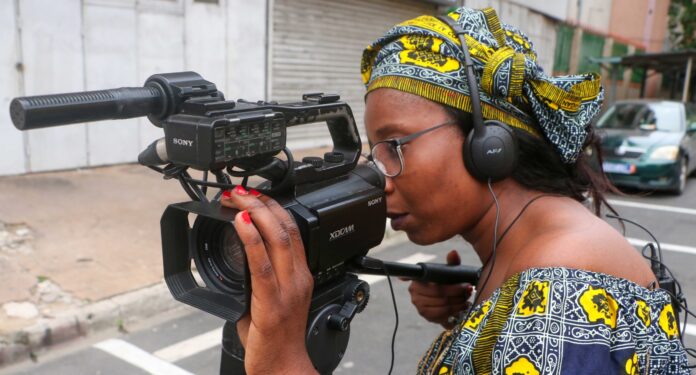For more than twenty years, M’ma Camara has covered current affairs in Côte d’Ivoire and the region for notable news organizations. A veteran on the security and defense beat, Camara has reported from conflict zones and experienced some of the profession’s harshest realities. Yet, she has found it hard to meet other Ivorian women to trade career stories with.
“What’s unfortunate is that in Africa, we women represent less than 1% of video journalists. Some think it’s a job meant for men. But we absolutely belong here,” she told bird.
Earlier this year, the Federation of African Journalists (FAJ) said in a statement addressing violence, harassment, and discrimination against women journalists in Africa that “the lack of women in leadership positions in media organizations further exacerbates challenges, as newsroom policies and editorial decisions continue to be shaped predominantly by men.”
These days, Camara is pushing to bring more women into the field and offers hands-on training and mentorship. She believes the future of journalism depends on knowledge transfer. She tells women journalists that they must learn to manage their professional and personal lives.
“You must explain your job’s demands to your partner, your family, your loved ones. Because if you don’t, you’ll be judged and often left behind. Many women end up leaving this wonderful profession, even though it is both versatile and exciting,” she told the ones who had shown up to learn news videography.
She walked through the streets of Abidjan’s Plateau district with the eager trainees who followed behind handling cameras and tripods. The pavement was still warm from the morning sun, and passersby slowed down to observe the small group. Dressed in a bright pink power blazer, Camara adjusted settings, corrected posture, and fine-tuned shooting angles. Each piece of advice was direct and precise, yet always delivered with patience. She has inspired many, including Doria Yedo, who is now a video journalist at La Nouvelle Chaîne Ivoirienne.
“When I started, I was mostly surrounded by men. M’ma Camara was the first female figure I met, and we immediately connected. She inspired me a lot through her way of working, her boldness, and her love for the profession. With her, it was always about the work first and I admit I loved that,” Yedo told bird.
As Côte d’Ivoire approaches a decisive election scheduled for October 25, 2025, Camara is setting up her coverage plan. Recently, she interviewed Simone Gbagbo, the country’s former First Lady and the only woman running for president in elections. With her background as a war correspondent, she knows that the stakes are high. She wants this moment to serve as an opportunity for women journalists to assert themselves.
“Today, we are starting to gain visibility, even if it is still limited. The big challenge is maintaining that commitment. Many women give up after two or three years because they find the job too demanding. But if we want to move forward, we have to persevere and stay organized,” she said.
A true trailblazer
Camara has become a symbol. Her impact in the Ivorian media landscape has been widely felt, and others are beginning to see the value of having more women in the field.
“M’ma Camara is doing what she can, but more needs to be done. We need other M’ma Camaras to step up and amplify the transfer of knowledge so that we can soon have dynamic young women who are journalists, and in positions of leadership. Once we have women in management, in newsrooms, I believe they will also be able to uplift other women through internships, for example. M’ma Camara is a true role model,” said Julien Adaye, the vice-chairperson of the Ivory Coast Foreign Correspondents Association.
Ivory Coast enacted a law in 2019 that mandates at least 30% female representation on candidate lists for elections. It ignited broader calls for women’s leadership across sectors, including journalism. While not directly binding for the media, the law has fueled advocacy by groups like the Network of Women Journalists and Communication Professionals (ResFJPC). Their efforts have led to the creation of gender charters within the National Press Authority and inspired prominent outlets like Abidjan.net to prioritise in-house parity.
“Having women alongside us is not a bad thing…we must also, as men, accept to train women, offer them internships, and support them. Indeed, conferences in communication schools help motivate young girls to take an interest in this field,” Adaye added.
Camara is also the founder of MAHMEDIAS, an NGO focused on media education and fighting disinformation. She teaches journalism and communications at the Institut des Sciences et Techniques de la Communication (Institute of Communication Sciences and Technologies) and Académie des Forces Armées de Zambakro, a military academy.
In September 2023, she received the Excellence Award for Media Development at the Presidential Palace in Abidjan, a distinction awarded in the presence of the Head of State, Alassane Ouattara.
(c) bird story agency




